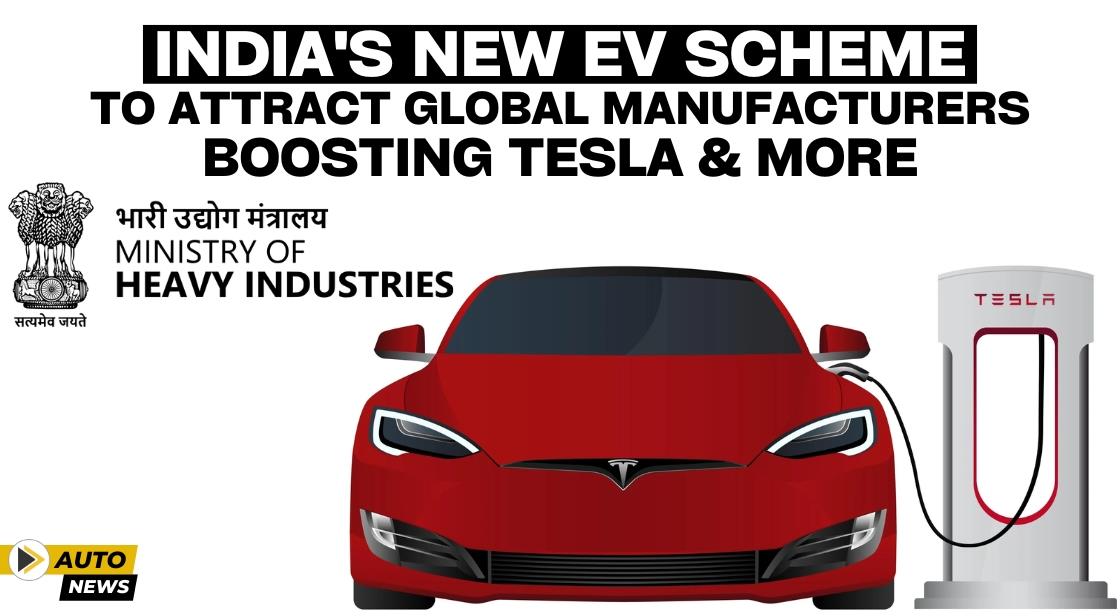India's New EV Scheme to Attract Global Manufacturers: Boosting Tesla and More

News Synopsis
The Indian government is making a big push to attract global electric vehicle (EV) manufacturers by introducing a new policy with significant benefits. This scheme aims to boost domestic EV production and establish India as a major EV hub.
Lower Import Duties for Increased Investment
The Ministry of Heavy Industries (MHI) announced the policy on Friday. A key feature is the substantial reduction in import taxes on certain EVs. Companies willing to invest at least $500 million (Rs 4,150 crore) and set up a manufacturing plant within three years can benefit from this incentive.
Reduced Duty Structure:
-
Current duty on fully assembled imported EVs (CBU) exceeding $40,000: 100%
-
Current duty on CBU priced below $40,000: 70%
-
New Reduced Duty under the Scheme: 15% on EVs with a CIF (cost, insurance, and freight) value of $35,000 and above, for five years from government approval.
This reduced duty structure aligns with the demands put forth by Tesla during discussions with the Indian government.
Open to All Global Players, with Conditions
Navigating Regulatory Hurdles:
However, companies from nations sharing land borders with India must navigate additional regulatory requirements, as stipulated in recent amendments to the Foreign Direct Investment (FDI) policy. While the scheme aims to attract global investments, it maintains measures to safeguard domestic interests and regulatory compliance.
Important to Note: While the policy welcomes all international participants, including Chinese manufacturers, there's a caveat. Companies from countries sharing land borders with India (China, Pakistan, etc.) need to obtain additional government approval as per the 2022 FDI policy amendments.
Eligibility Criteria:
-
Minimum investment of $500 million (Rs 4,150 crore)
-
Manufacturing plant established within three years
-
Achieve 50% localization level by the fifth year of operations
Companies meeting these criteria can enjoy the reduced import duty benefit.
Addressing Existing Demand and Future Growth
The government official working on the scheme highlighted two key goals:
-
Attracting new global original equipment manufacturers (OEMs) to set up shop in India.
-
Enabling existing carmakers to import EV models currently unavailable in the Indian market.
This policy caters to both established players seeking to expand their EV offerings in India and new entrants looking for a foothold in the promising Indian EV market.
Tesla's Influence and Policy Details
While the scheme is designed to be inclusive, it's no secret that Tesla's strong advocacy for lower import duties played a role. In December 2023, Tesla reportedly requested a duty reduction on CBUs to 15% and proposed including charging infrastructure as part of the investment definition.
Key EV policy Details:
-
Maximum duty waiver per OEM: Rs 6,484 crore
-
Minimum revenue threshold for applicant company: Rs 10,000 crore from automotive manufacturing
-
Global investment commitment: Rs 3,000 crore in fixed assets
Import Allowance:
-
Minimum CIF value for imported EVs: $35,000 (Rs 29 lakh)
-
Duty rate: 15% for five years
-
Maximum number of EVs allowed to be imported per year: 8,000 units
Companies can import a specific number of cars based on their investment amount over five years. However, the annual import cap ensures controlled entry.
Investment Security:
The investment commitment needs to be backed by a bank guarantee equivalent to the potential customs duty forgone. This guarantee is only refunded upon achieving 50% domestic value addition and making the minimum investment of Rs 4,150 crore (or the total duty forgone over five years, whichever is higher).
Applications and Next Steps
The MHI will announce a window for applications within the next 120 days. This window might be extended based on the initial response. The aim is to attract major global EV players and accelerate India's transition to a greener future.









